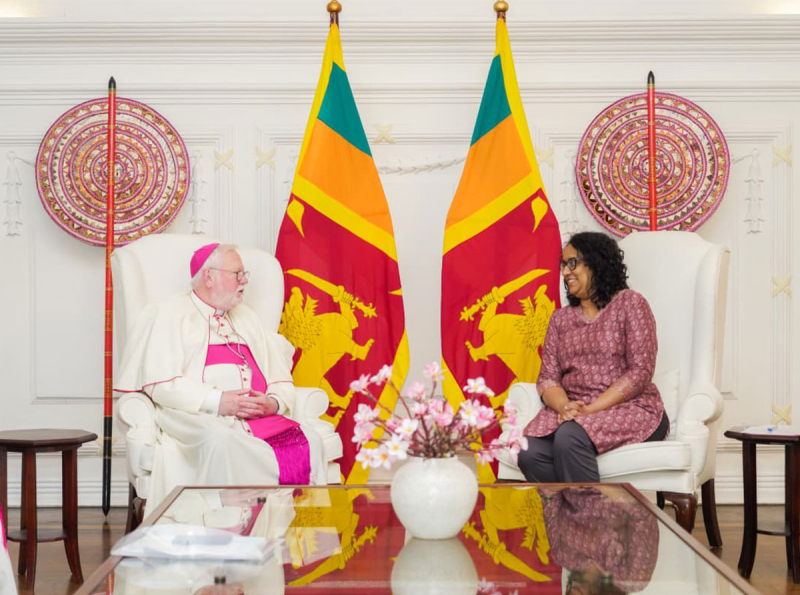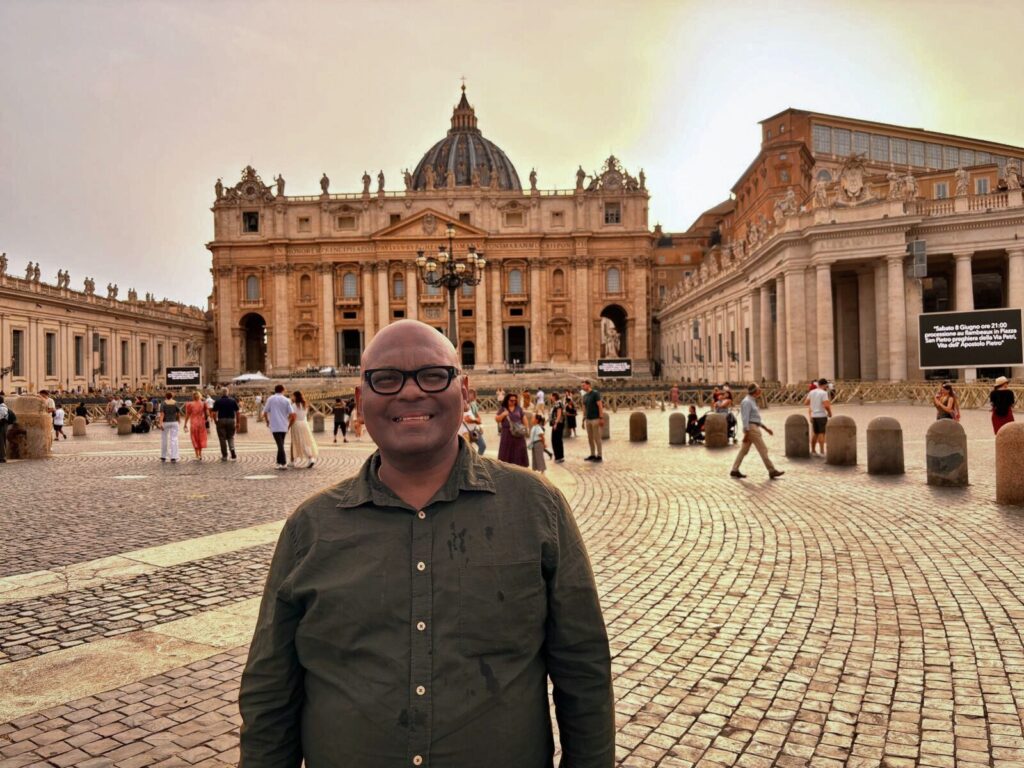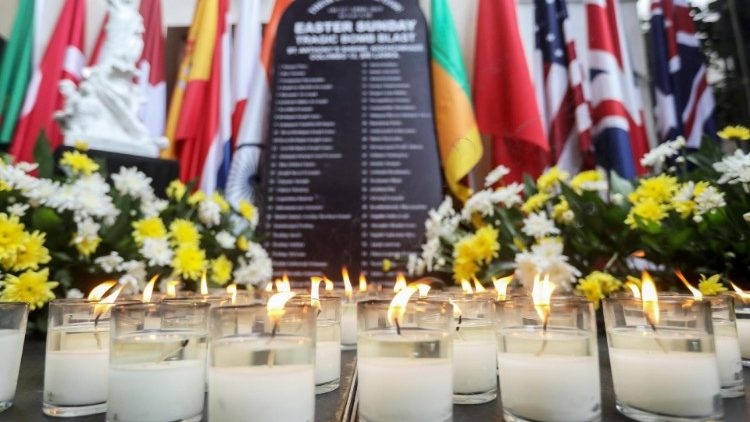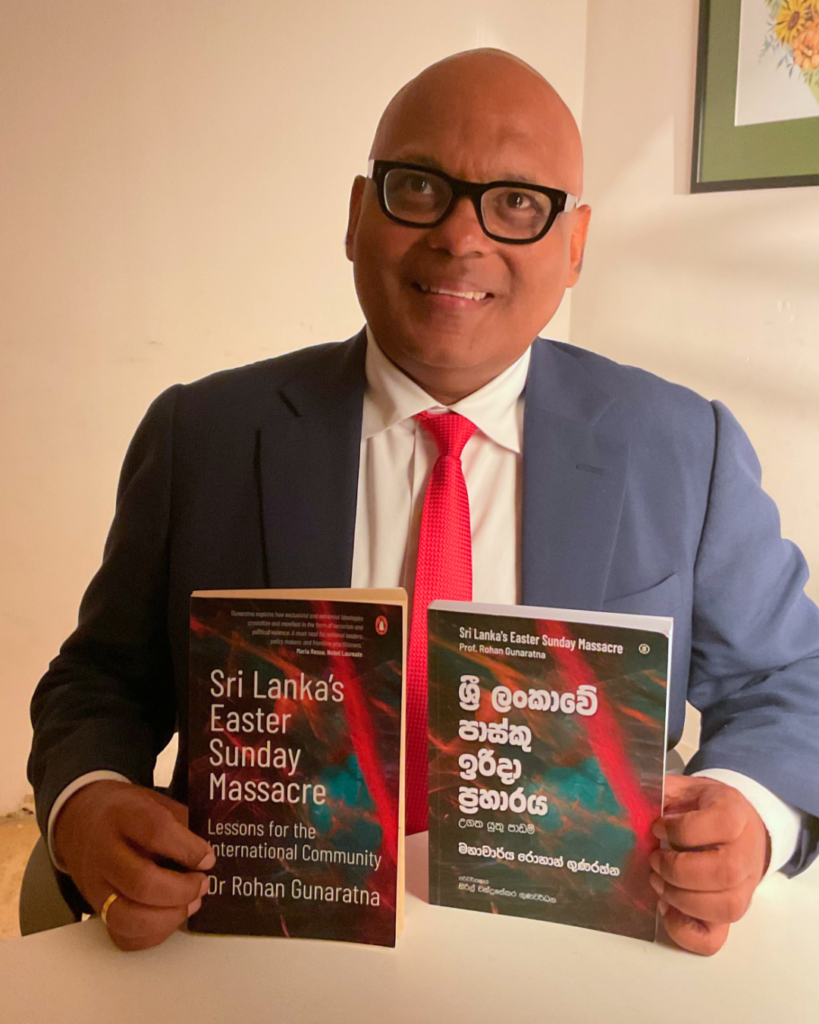
By Rohan Gunaratna
Dear Foreign Minister Archbishop Paul Richard Gallagher, Welcome to Sri Lanka! I am pleased to see that you have met the Prime Minister and that you will be visiting the Easter Sunday attack sites in Sri Lanka.
Sri Lanka is a beautiful country with wonderful people. Ten years after the end of the three-decade war, the entire nation was shocked by the Easter Sunday attack in 2019.

When the Easter Sunday attack took place in Sri Lanka, I was visiting Fukushima, the site of a radiological disaster in Japan together with counter terrorism officials from the Prime Minister’s Office of Japan. Having publicly highlighted the persistent threat posed by the Islamic State since November 2016, I received a phone call from the staff of the National Security Council in Sri Lanka to meet with the government of Sri Lanka, including the then President.
While in Sri Lanka, I visited the attack sites in Sri Lanka’s Western and Eastern Province that were immediately secured by the Sri Lanka police to preserve the evidence. I met with some of the finest Sri Lankan law enforcement officers and also the men and women of the FBI who brought in unprecedented expertise and experience.
The response of the United States of America, especially the Federal Bureau of Investigation (FBI) into Sri Lanka’s Easter Sunday attack is a defining moment in the history of counter terrorism. Immediately after Sri Lanka’s Easter Sunday attack on April 21, 2019 that killed five US nationals, an FBI team located in Singapore flew into Colombo.
In addition to the Assistant Law Enforcement Attaché from Singapore, to preserve the evidence in the attack sites, the FBI’s Special Agent Bomb Technician helped immensely. They were supported by the FBI Fly Team, a group of highly trained counterterrorism investigators—including special agents and intelligence analysts—based at FBI Headquarters who stand ready to deploy anywhere in the world on a moment’s notice. The Fly Teams strategic and tactical counterterrorism capabilities were enhanced by their partnership with other U.S. government agencies and foreign-partner nation entities in critical overseas locations to detect, penetrate, and disrupt terrorist networks.
The initial team of FBI officers who flew into Sri Lanka successfully engaged with the US Embassy in Colombo and the Sri Lankan government. This engagement enabled a larger team of FBI investigators from the U.S. to travel to Sri Lanka. Together with Sri Lanka’s Criminal Investigations Department and its Counter Terrorism Division, three FBI teams investigated the attack.
- Evidence Response Team (ERT)
- Critical Analysis and Response Team (CART)
- High-value detainee interrogators
In parallel to US assistance, other foreign governments especially from countries that lost their citizens, dispatched their investigators and intelligence officers. In addition to the FBI and the US military, other US government agencies too supported Sri Lanka to build its capabilities to fight terrorism. The two governments that capacitated Sri Lanka to fight the threat were the Americans and Australians, notably the Australian Federal Police (AFP).
INTERPOL’s Incident Response Team (IRT) was deployed in Sri Lanka too with specialists with expertise in crime scene examination, explosives, counter-terrorism, disaster victim identification and analysis. Additional expertise in digital forensics, biometrics, as well as photo and video analysis was added to the team on the ground. Furthermore, INTERPOL assistance led to the arrest of several Islamic State leaders and members overseas.
The FBI, AFP, Interpol, and all the other investigative authorities in their reports and debriefings stated that Sri Lanka’s Easter attack was conducted by the Sri Lanka Branch of the Islamic State.
Of the law enforcement authorities worldwide, FBI, AFP and New Scotland Yard represents the gold standard. Their reports complement the fact-finding investigations and the local mechanisms by the Sri Lankan government.
Unfortunately, a few Sri Lankans with personal and political interests have propagated conspiracy theories. Without any evidence, the false narrative prompted by a few politicians and officials argue that the Easter Sunday attack was staged by the RA&W, Sri Lankan intelligence, Sri Lanka Military, CIA and by the MOSSAD. The truth is distorted by unscrupulous politicians who want to capture or remain in power, poorly educated officials who want to curry favour with the politicians, unethical YouTubers who wants likes and views, separatists who have an axe to grind, and Muslim radicals who wish to whitewash the extremists.
The Federal Bureau of Investigation (FBI), Australian Federal Police, New Scotland Yard, and Interpol identified Zahran as the Easter attack mastermind and religious extremism as the motive. Their findings are consistent with the global trend of exclusivism, extremism, violence and terrorism and I have collated all the reports on my website for easy access to all. They can be accessed here.
Besides the international investigative agencies, the subsequent Sri Lankan governments and political leadership appointed investigations into the Easter Sunday attack too. They include the following reports:
- The “Select Committee of Parliament Report” (October 23, 2019). This comprehensive analysis covers intelligence failures, communication breakdowns, political mismanagement, and community issues, offering a complete perspective. This is a great starting point for most looking to understand the inner workings of the attack.
- The “Final Report of the Commission of Inquiry” (January 31, 2021). Commissioned at the request of Cardinal Malcolm Ranjith, this 700-page report delves deeply into the history, causes, and terrorist ideology behind the attack. This report is extremely detailed and is for those who want to understand this attack, its root causes and get a holistic understanding of what transpired.
- The “Special Investigation Board Report” (June 10, 2019). Led by Justice Vijith Malalgoda and appointed by then-President Maithripala Sirisena, this report was not made public, but a Sinhala summary is available.
- The “Channel-4 Allegations Inquiry Report” (June 25, 2024). This investigation was commissioned to address claims made in a Channel-4 program, it is very insightful and attempts to address every claim made by Channel 4 witness, Azad Moulana, concluding that most allegations were unfounded.
- The “Intelligence Coordination and Investigative Processes Report” (September 14, 2024). Led by retired Judge A.N.J. De Alwis, this report evaluates whether authorities acted appropriately based on pre-attack intelligence. This report will help understand where the authorities failed specifically at individual levels and the overall structure of the security policy level.
- Finally, read the “Sectoral Oversight Committee on National Security Report” (February 19, 2020). This report offers recommendations for new laws to prevent terrorism and strengthen intercommunal harmony in Sri Lanka. This report is an attempt to learn from our mistakes and ensure this kind of attack never happens again.
- Report of the Cabinet Ministerial Sub-Committee appointed on the implementation of the recommendations of the Presidential Commission on the Easter Sunday Attacks and the Oversight Committee on National Security (April 05, 2021)
All the reports can be accessed here.

In Sri Lanka, inadequate management of the information space has led to widespread misinformation, with 53% of Sri Lankans mistakenly believing that the Easter Sunday attack, perpetrated by an ISIS-inspired group, involved the Sri Lankan military. This misconception is entirely unfounded, as evidenced by my firsthand interviews with key detainees of the attack and as evidenced by the numerous reports produced by local appointed officials and international governments.
Having personally reviewed reports on the detainees’ electronic devices, including laptops, iPads, and servers, I can confirm that the Easter Sunday attack was unequivocally carried out by the Islamic State. Yet, pervasive fake news on the internet has misled the public into believing the military played a role. This underscores the critical need to control the information space. Without such measures, Sri Lanka risks fostering a generation misinformed by falsehoods, despite its near-100% literacy rate, which historically positioned the nation as a leader in the region. Rather than believe in rumour, conjecture and manipulation, people should believe in EVIDENCE-BASED investigations.
Without politicising a catastrophic terrorist attack for personal gain, I have continuously urged politicians and clergy to accept the truth revealed by the world’s leading investigative authorities.
Prior to the attack, the Sri Lankan intelligence community issued 337 intelligence reports to the Sri Lankan National Security Council, IGP, and CID about the threat of terrorism from January 2015-April 2019.
The reports originated from the:
- SIS – State Intelligence Service
- MI – Military Intelligence
- SB – Special Branch
- WPIS – Western Province Intelligence Service
- NI – Naval Intelligence
- AI – Air Intelligence
- STF Intelligence – Special Task Force Intelligence
The reports refer to the:
- Islamic State (ISIS)
- Zahran Hashim, and
- Muslim radicalisation
as primary reasons for the Easter Sunday attack. Political negligence, too has been cited as a reason the attacks could not be prevented.
In spite of these 337 intelligence reports, former President Maithripala Sirisena did not act. In addition, because they were dependent on Muslim votes, politicians too compromised national security. When former Justice Minister Wijedasa Rajapaksa said in parliament that Sri Lankan Muslims were travelling to Syria, Muslim MPs attacked him. The result was the Easter Sunday attack. Six years after, with the failure of government to take decisive action to rehabilitate the terrorist and prevent the ongoing community radicalisation, future attacks are inevitable.
In the light of the 337 reports, it is paramount to take action against government officers who have neglected their duties. It is imperative to take action against the religious leaders who did not protect the religious space. It is also imperative to take action against politicians and others who spread fake news.
The Easter Sunday attack has become a political football for governments to come to power and to remain in power. Furthermore, religious authorities should not interfere in investigations. As long as national security is compromised for political and personal gain and the very real threat is not addressed, the likelihood of another attack is looming.
The intelligence community has been blamed for the Easter attack. The primary responsibility rests with the politicians who did not provide political direction and the officials that failed to act.
I have explained the role of the intelligence community and based on the investigative reports and my own interviews with Zahran’s widow and the Islamic State leadership, I have also presented with evidence how the attack was organised in my book “Sri Lanka’s Easter Sunday Massacre – Lessons for the International Community” in English published by Penguin and “Sri Lanka’s Easter Sunday Attack – Lessons to be Learnt” in Sinhala published by Sarasavi.
The Vatican-led by His Holiness Pope Leo XIV and Your Excellency should put an end to the conspiracy theory based on false narratives that RAW, Mossad, and Sri Lankan intelligence was behind the Easter Sunday attack. The Vatican should direct its cardinals and other representatives not to get involved in politics and always to tell the truth. The Vatican intelligence service should report to the Holy Father and to leaders such as Your Excellency the truth so that trust in the church can be restored. In the case of the Easter Sunday attack, there is a body of evidence both based on domestic and foreign investigations especially by the FBI, Australian Federal Police, New Scotland Yard and INTERPOL that the massacre was conducted by the Islamic State Sri Lanka Branch. Truth is vital to restore trust and to deliver justice. If the church continues to parade a conspiracy theory and false narratives, the government will no longer focus on the threat, and Sri Lanka will suffer another attack! The threat of religious exclusivism, extremism, violence and terrorism is real and they should be addressed earnestly without wallowing in conspiracy theories and false narratives!
Rohan Gunaratna
